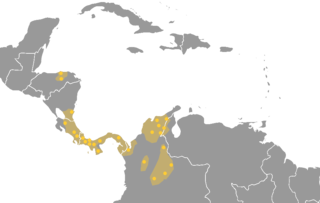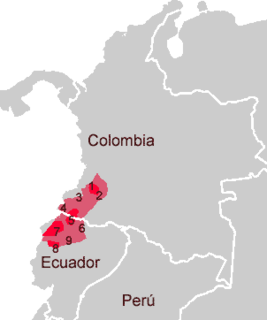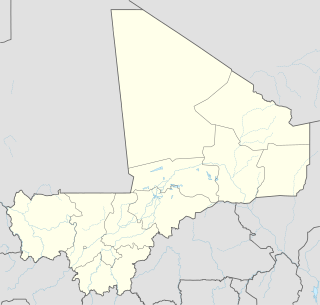
Ecuador, officially the Republic of Ecuador, is a country in northwestern South America, bordered by Colombia on the north, Peru on the east and south, and the Pacific Ocean on the west. Ecuador also includes the Galápagos Islands in the Pacific, about 1,000 kilometres (621 mi) west of the mainland. The capital is Quito.

The Chibchan languages make up a language family indigenous to the Isthmo-Colombian Area, which extends from eastern Honduras to northern Colombia and includes populations of these countries as well as Nicaragua, Costa Rica, and Panama. The name is derived from the name of an extinct language called Chibcha or Muysccubun, once spoken by the people who lived on the Altiplano Cundiboyacense of which the city of Bogotá was the southern capital at the time of the Spanish Conquista. However, genetic and linguistic data now indicate that the original heart of Chibchan languages and Chibchan-speaking peoples may not have been in Colombia at all, but in the area of the Costa Rica-Panama border, where one finds the greatest variety of Chibchan languages.

Putumayo is a department of Colombia. It is in the south-west of the country, bordering Ecuador and Peru. Its capital is Mocoa.

Napo is a province in Ecuador. Its capital is Tena. The province contains the Napo River. The province is low developed without much industrial presence. The thick rainforest is home to many natives that remain isolated by preference, descendants of those who fled the Spanish invasion in the Andes, and the Incas years before. In 2000, the province was the sole remaining majority-indigenous province of Ecuador, with 56.3% of the province either claiming indigenous identity or speaking an indigenous language.
AWA may be an abbreviation for:

Barbacoan is a language family spoken in Colombia and Ecuador.
The Cofan people are an indigenous people native to Sucumbíos Province northeast Ecuador and to southern Colombia, between the Guamués River and the Aguarico River. Their total population is now only about 1,500 to 2,100 people, down from approximately 15,000 in the mid-16th century, when the Spanish crushed their ancient civilization, of which there are still some archeological remains. They speak the Cofán language or A'ingae. The ancestral land, community health and social cohesion of Cofan communities in Ecuador has been severely damaged by several decades of oil drilling. However, reorganization, campaigning for land rights, and direct action against encroaching oil installations have provided a modicum of stability. Major settlements include Sinangué, Dovuno, Dureno and Zábalo, the latter of which has retained a much more extensive land base.
Cofan or Cofán may refer to:
Páez is a language of Colombia, spoken by the Páez people. Crevels (2011) estimates 60,000 speakers out of an ethnic population of 140,000.
The Cofán language is the language of the Cofán people, an indigenous group native to the province of Sucumbíos in northeast Ecuador and southern Colombia.
More than 99.2% of Colombians speak the Spanish language; also 65 Amerindian languages, 2 Creole languages, the Portuguese language and the Romani language are spoken in the country. English has official status in the San Andrés, Providencia and Santa Catalina Islands.
The most common and addition to Northern Quechua and other pre-colonial American languages, which are spoken by 2,300,000. Ethnologue lists 24 languages of Ecuador:

The languages of South America can be divided into three broad groups:

The following outline is provided as an overview of and topical guide to Ecuador:

The following outline is provided as an overview of and topical guide to South America.
Maku or Maco is a pejorative term referring to several hunter-gatherer peoples of the upper Amazon, derived from an Arawakan term ma-aku "do not speak / without speech". Nimuendajú (1950), for example, notes six peoples of Colombia, Venezuela, and Brazil that are known as 'Maku'. In linguistic literature, the term refers primarily to:

Kafana is a small town and seat of the commune of Kofan in the Cercle of Sikasso in the Sikasso Region of southern Mali.
The Intercontinental Dictionary Series is a large database of topical vocabulary lists in various world languages. The general editor of the database is Bernard Comrie of the Max Planck Institute for Evolutionary Anthropology, Leipzig. Mary Ritchie Key of the University of California, Irvine is the founding editor. The database has an especially large selection of indigenous South American languages and Northeast Caucasian languages.
The Andaquí are an indigenous people of Colombia, who live in the Upper Caquetá River Basin, the Fragua Valley of Cauca Department, and the Suaza Valley of southwest Huila Department.
This page is based on this
Wikipedia article Text is available under the
CC BY-SA 4.0 license; additional terms may apply.
Images, videos and audio are available under their respective licenses.







